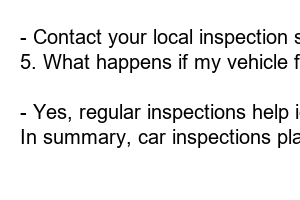자동차 검사 유효기간
Title: Understanding the Validity Period of Car Inspections
Introduction:
When it comes to ensuring your vehicle’s safety and compliance with road regulations, regular car inspections are crucial. But how long are these inspections valid? In this article, we will delve into the validity period of car inspections and discuss everything you need to know.
1. What is a Car Inspection?
A car inspection is a comprehensive evaluation of your vehicle’s condition, focusing on its safety features, emissions, and overall functionality. It is designed to keep both you and other road users safe, ensuring that your vehicle meets the required standards.
2. The Validity Period:
In most jurisdictions, including the United States, the validity period of car inspections can vary. Typically, inspections are required annually or biennially, depending on the state or country regulations. It’s important to be aware of your local laws concerning inspection validity to avoid any penalties or fines.
3. Duration of Validity:
The duration of a car inspection’s validity period is determined by various factors. These include your vehicle’s age, type, and usage. Generally, newer vehicles tend to have longer inspection validity periods compared to older ones, as they are assumed to be in better condition.
4. Other Factors Affecting Validity Period:
Apart from your car’s age and type, there are other factors that may impact the duration of your vehicle inspection validity. Usage patterns, such as high mileage or extreme weather conditions, may require more frequent inspections to ensure ongoing safety. Moreover, if your vehicle has previously failed an inspection, it might need to undergo more frequent checks to ensure compliance.
5. Importance of Regular Inspections:
Maintaining a regular car inspection schedule is crucial for several reasons. Firstly, it helps identify potential mechanical issues promptly, allowing for timely repairs to prevent accidents or breakdowns. Secondly, inspections contribute to reducing harmful emissions and promoting environmentally friendly practices. Lastly, routine inspections enhance overall road safety, ensuring that vehicles on the road meet the necessary safety standards.
6. Renewing an Expired Inspection:
If your car inspection has expired, it is crucial to take prompt action. Continuing to drive with an expired inspection can lead to serious consequences, such as fines or even suspension of your vehicle registration. Contact your local inspection station or mechanic to schedule a new inspection and ensure compliance with regulations.
Frequently Asked Questions (FAQs):
1. How long is a car inspection valid for?
– The validity period of car inspections varies depending on your location, but it is typically annually or biennially.
2. Do different types of vehicles have different inspection validity periods?
– Yes, the inspection validity period can vary based on your vehicle’s age, type, and usage.
3. Can I drive with an expired inspection?
– No, driving with an expired inspection can result in fines or other penalties. It’s important to renew your inspection promptly.
4. How can I schedule a car inspection?
– Contact your local inspection station or a certified mechanic to schedule a car inspection.
5. What happens if my vehicle fails an inspection?
– If your vehicle fails an inspection, necessary repairs must be made, and the car must be re-inspected before the validity period expires.
6. Do inspections contribute to reducing harmful emissions?
– Yes, regular inspections help identify and fix issues that may lead to increased emissions, promoting a cleaner environment.
In summary, car inspections play a vital role in ensuring road safety and compliance with regulations. The validity period of these inspections varies based on factors like your vehicle’s age, type, and usage. Regular inspections are imperative, not only for safety but also for maintaining the overall health of your vehicle. Remember to schedule your inspections promptly and renew them in a timely manner to avoid any legal consequences.

